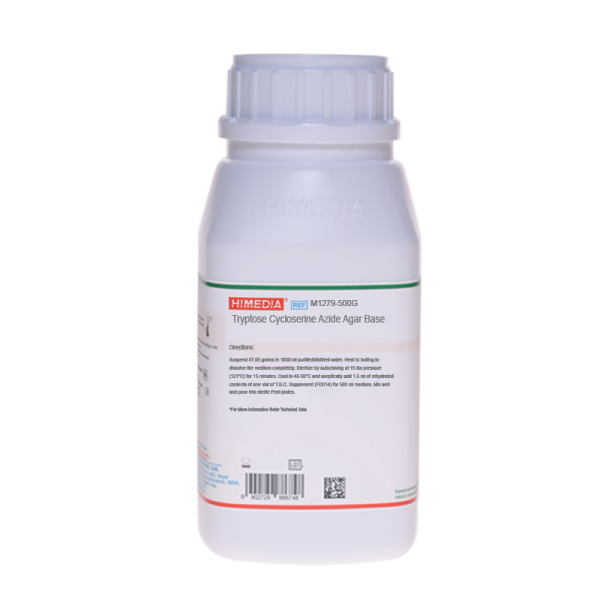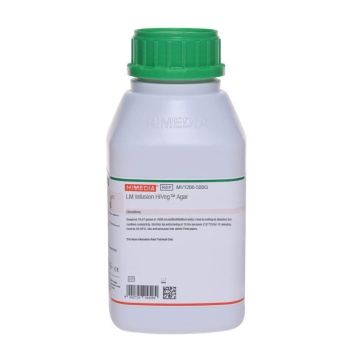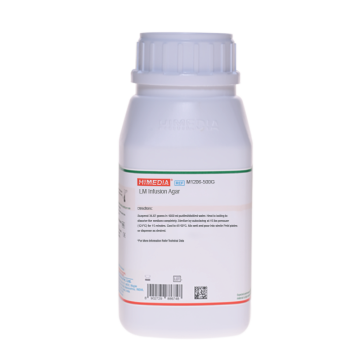 Your enquiry has been submitted
Your enquiry has been submitted
Tryptose Cycloserine Azide Agar Base
Clostridium#CC293D
Tryptose Cycloserine Azide Agar Base is recommended for enumeration of sulphite reducing anaerobes essentially Clostridia.
Composition**
| Ingredients | Gms/Litre |
|---|---|
| Tryptose | 15.000 |
| Papaic digest of soyabean meal | 5.000 |
| Meat extract | 5.000 |
| Yeast extract | 5.000 |
| Glucose | 2.000 |
| Disodium disulphite | 0.500 |
| Ferric ammonium citrate | 0.500 |
| Sodium azide | 0.050 |
| Agar | 14.000 |
| Final pH (at 25°C) | 7.4±0.2 |
**Formula adjusted, standardized to suit performance parameters
Directions
Suspend 23.52 grams in 500 ml distilled water. Heat to boiling to dissolve the medium completely. Sterilize by autoclaving at 15 lbs pressure (121°C) for 15 minutes. Cool to 50°C and aseptically add 1.5 ml rehydrated contents of 1 vial of T.S.C. Supplement (FD014) for 500 ml medium. Mix well and pour into sterile Petri plates.
Warning: Sodium azide has a tendency to form explosive metal azides with plumbing materials. It is advisable to use enough water to flush off the disposables.
Principle And Interpretation
Tryptose Cycloserine Azide Agar Base was originally formulated by Hauschild and Hilsheimer (1). This medium was later modified by decreasing the concentration of D-cycloserine, sulphite and iron and by the addition of sodium azide (2, 3). This medium utilizes the selective inhibitory properties of D-cycloserine and an indicator system involving sulphite and iron. Growth of non-mesophillic organisms are suppressed while C. perfringens and related species will reduces the sulphite and form black colonies due to the production of ferrous sulphide (4).
Tryptose, papaic digest of soyabean meal, meat extract and yeast extract provide essential nitrogenous compounds and vitamins needed for the growth of anaerobes. Glucose serves as carbon source. Disodium disulphite is reduced to hydrogen sulphide which combines with ferric ions of ferric salts to produce the insoluble black precipitate of ferrous sulphide. D-Cycloserine (FD014) and sodium azide inhibit a number of organisms including Bacillus species, enteric bacilli, Proteus Pseudomonas and most of the cocci. Some anaerobes reduce sulphite to hydrogen sulphide (H2S) which is indicated by blackening of the colonies due to presence of ferric ammonium citrate.
Quality Control
Appearance: Cream to brownish yellow homogeneous free flowing powder
Gelling: Firm, comparable with 1.4% Agar gel.
Colour and Clarity of prepared medium: Yellow to amber coloured clear to slightly opalescent gel forms in Petri plates.
Reaction: Reaction of 4.7% w/v aqueous solution at 25°C. pH: 7.4±0.2
pH: 7.20-7.60
Cultural Response
M1279: Cultural response observed after an incubation at 35-37°C for 18-24 hours with added T.S.C. Supplement (FD014).
| Organism | Inoculum (CFU) | Growth | Recovery | Colour of colony |
|---|---|---|---|---|
| Clostridium perfringens ATCC 12924 | 50-100 | good | >=50% | black |
| Clostridium sporogenes ATCC 11437 | 50-100 | good | >=50% | black |
| Escherichia coli ATCC 25922 | >=103 | inhibited | 0% | |
| Staphylococcus aureus ATCC 25923 | >=103 | inhibited | 0% |
Storage and Shelf Life
Store below 30°C in tightly closed container and the prepared medium at 2-8°C.Use before expiry date on the label.
Reference
- Hauschild A. H. W. and Hilsheimer R., 1974, Appl. Microbiol., 27, 521-527.
- Eisgruber H., 1986, Vet Med. Diss. FU Berlin.
- Eisgruber H. and Reuter G., 1991, Arch. Lebensmittelhyg, 42,125-129.
- Corry J. E. L., Curtis G. D. W. and Baird R. M., 1995, Culture Media for Food Microbiology, Vol. 34, ELSEVIER, Amsterdam.
| Product Name | Tryptose Cycloserine Azide Agar Base |
|---|---|
| SKU | M1279 |
| Product Type | Regular |
| Physical Form | Powder |
| Origin | Animal |
| Packaging type | HDPE |
| References | 1. Hauschild A. H. W. and Hilsheimer R., 1974, Appl. Microbiol., 27, 521-527. |
| Customized Product Available | No |








